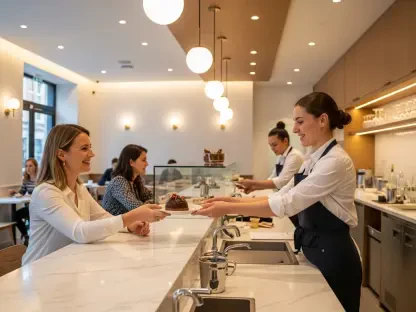The hospitality real estate landscape is undergoing a transformative shift, driven by changing consumer demands and a rapidly growing global middle class. This evolution is further accelerated by the increase in remote work, creating a need for multipurpose spaces that transcend traditional boundaries. As a result, mixed-use developments, which integrate hotels with residential, retail, and working environments, are gaining traction as the future of leisure real estate. By blending functionalities, these complex developments cater to the modern consumer’s desire for flexibility, convenience, and diverse experiences, challenging traditional models that silo different real estate categories.
Redefining Space with Flexible Models
Integrating Multiple Asset Classes
The concept of integrating multiple asset classes within a single development is gaining significant attention for its resilience and adaptability amid changing market demands. Richard Dawes, from Savills, emphasizes that mixed-use developments serve as a safeguard for asset value by combining hospitality with other uses. This multifaceted approach allows projects to traverse economic cycles more effectively by not relying solely on a single revenue stream. By partnering hospitality services with coworking spaces, residential units, and retail operations, these developments create a synergistic environment that supports contemporary living and caters to a wide range of consumer needs. As more projects harness this integrated model, they demonstrate how traditional boundaries can be blurred to create vibrant, self-sustaining ecosystems.
Pioneering Projects Leading the Way
Innovative projects by companies like Finamas, CEPAC, Rockbridge, and others are leading the charge by creating multifunctional environments. These pioneers in mixed-use development offer spaces where people live, work, and engage in leisure activities, all within one location. The Columbus North Market development by Rockbridge and Edwards embodies this concept by offering diverse experiences without leaving the premises. Operators like Zoku and The Social Hub have also recognized the potential of transforming typical residential or hotel spaces into dynamic places of interaction. This trend underscores how mixed-use models not only provide accommodation but create complete lifestyle hubs enriched with options for dining, leisure, and cultural engagement.
Consumer-Centric Experiences Drive Development
Creating Integrated Experiences
In an era where consumer expectations are evolving at an unprecedented pace, delivering integrated experiences within a single development becomes paramount. Adela Cristea from Radisson Hotel Group highlights the necessity for developments to extend beyond mere accommodation to offer museums, concerts, and diverse dining options. This shift towards a comprehensive approach is pivotal, especially in gateway cities, where the footfall and leisure demand are crucial considerations. By accommodating a variety of experiences in one development, these projects become destinations in their own right, attracting both residents and tourists. This strategy not only boosts occupancy rates but also enhances the overall appeal and sustainability of the project.
Financial Dynamics and Investment Appeals
The financial dynamics surrounding mixed-use developments are also evolving, driven by changing investor perceptions. Previously, mixed-use projects were often avoided by institutional investors due to their complexity in managing diverse risk profiles. However, as demand for flexible spaces grows, investors are becoming more comfortable with the concept. Richard Dawes notes that a growing body of data is supporting these investments, validating their feasibility and profitability. This shift is encouraging investors and financial institutions to reconsider their approaches, recognizing the long-term value and resilience that mixed-use developments provide. The convenience and efficiency of these complexes are becoming attractive propositions for both short-term and long-term investments.
Navigating the Challenges of Complex Operations
Balancing Diverse Operational Needs
While mixed-use developments boast numerous advantages, they also present unique challenges, particularly in terms of operations. Operators are required to master a range of domains from hotel management to retail operations, each with distinct logistical needs. As these properties become more prevalent, the ability to manage and coordinate assorted functions efficiently becomes paramount. Expertise in balancing these needs across hospitality, coworking, and retail spaces is vital. Successful operation hinges on the proficiency to harmonize the various segments under one roof, ensuring smooth day-to-day operations as well as meeting diverse guest expectations.
The Future of Leisure Real Estate
Despite the operational complexities, the future of leisure real estate is intertwined with the concept of mixed-use developments. By offering flexibility and adapting to evolving demands, these developments present a robust model for future investments. The ability to accommodate short-term needs through hotels and coworking spaces while offering long-term attractions like residential units and shopping venues ensures that such projects remain relevant. This adaptability is a significant benefit, future-proofing investments against market volatility and evolving consumer preferences. The multifaceted nature of mixed-use developments ensures they are not just a temporary trend but a transformative force reshaping the industry.
A Transformative Vision for Hospitality Real Estate
The hospitality real estate sector is undergoing a significant transformation, spurred by evolving consumer needs and the expansion of the global middle class. This shift is further propelled by the rise of remote work, fueling demand for adaptable spaces that go beyond conventional limits. As a consequence, mixed-use developments, which seamlessly integrate hotels with residential, retail, and work areas, are emerging as key contenders in the evolution of leisure real estate. These dynamic developments offer an enticing blend of functionalities, catering to the modern consumer’s preference for flexibility, convenience, and a range of experiences. Traditional models that separate various real estate categories are being challenged, as mixed-use spaces gain popularity. By responding to the contemporary demand for multifunctional venues, these developments are redefining the landscape, offering diverse and integrated environments that align with lifestyle changes and expectations.









